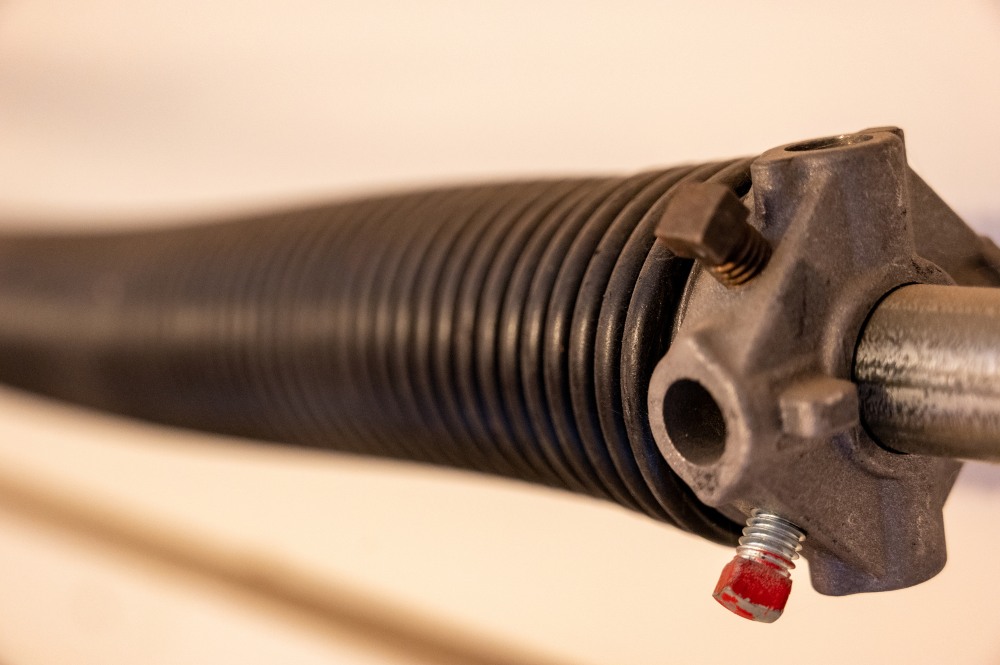
Garage door springs are the oft-forgotten backbone of a smoothly operating garage door. Their job is to bear the weight and provide the tension necessary to lift and lower the door. Learn about the different types of springs, the signs they’re wearing out, and the importance of leaving garage door spring repair to a professional.
Types of Garage Door Springs
There are two primary types of garage door springs: extension springs and torsion springs. Each type functions differently and has specific applications, benefits, and limitations.
Extension Springs
Extension springs often work in pairs. They are mounted on either side of the garage door, positioned parallel to the horizontal tracks, and stretch or extend to carry the weight when the door is lowered. Conversely, when the door is raised, the tension is released, helping to lift the door.
Extension springs are typically used on lighter garage doors and are color-coded to indicate their weight capacity. For instance, white springs are rated for 110 pounds, yellow springs pair with doors weighing 130 pounds, and red springs can handle up to 150 pounds.
Although extension springs are easier to install, they often result in jerky movements because of variations in the level of force used during operation. They’re also more dangerous if they break because they can fly off with force. Safety cables are recommended to contain snapping springs and prevent accidents.
Torsion Springs
Torsion springs are mounted on a metal shaft above the garage door and use torque to lift the door. When the door closes, the springs wind up, storing energy. When the door opens, the springs unwind, releasing energy to assist in lifting the door.
These springs are more commonly used for heavier and wider garage doors. They can be customized based on the door’s weight and size, and they come in various lengths and diameters to match specific requirements.
Torsion springs generally last longer than extension springs. They also provide smoother operation and put less wear on other parts of the garage door system. They’re considered safer as well because they stay in place when they break, reducing the risk of injury. However, the high tension required at installation calls for professional replacement services.
Why Garage Door Springs Need Periodic Replacement
Garage door springs are designed to last a certain number of cycles. Over time, even the best-maintained springs will wear out and need replacement. Here’s why:
- Wear and tear: Every time you open or close your garage door, the springs go through a cycle. Standard springs are rated for around 10,000 cycles, which equates to about seven to 10 years of regular use. Higher-cycle springs are also available, rated to last up to 50,000 cycles.
- Metal fatigue: The constant stretching and contracting causes metal fatigue, which weakens the springs, reduces performance, and may lead to failure.
- Environmental factors: Exposure to moisture, temperature fluctuations, and corrosive elements may accelerate rusting and deterioration.
- Safety risks: A broken spring can lead to sudden and dangerous door falls. The best way to prevent this is to watch out for signs of wear and tear.
How You Know It’s Time to Replace Your Garage Door Springs
Here are some indicators that you should replace your garage door springs before they wear out completely and cause an accident:
- Difficulty opening or closing the door: If your garage door struggles to open or close smoothly, it could signal that the springs are losing tension.
- Unbalanced door: When one side of the garage door appears higher than the other during operation, it indicates that the springs are no longer providing balanced support. This imbalance can cause additional strain on the garage door opener.
- Excessive noise: While some noise is normal, loud creaking, grinding, or snapping suggests that the springs are worn out.
- Visible gaps or rust: Regularly inspect the springs for any visible gaps in the coils or signs of rust. Gaps mean the spring has lost tension, and rust indicates corrosion, both of which compromise the spring’s integrity.
- Door won’t stay open: If your garage door closes on its own after being opened, it means the springs are no longer counterbalancing the door’s weight effectively. This is a clear sign that the springs need to be replaced.
Benefits of Professional Garage Spring Repair
Replacing garage door springs is a complex and dangerous task requiring specialized knowledge and tools. Here are the benefits of hiring an experienced garage door company for the job:
- Safety: Garage door springs are under immense tension and can cause severe injury if mishandled. Professionals have the training to safely remove and install springs, minimizing the risk of accidents.
- Expertise: Technicians can quickly diagnose issues and determine the appropriate springs for your door. Their experience ensures the job is done correctly the first time, preventing future problems.
- Proper tools: Specialized tools are required to safely handle and install garage door springs. Professionals come equipped with these tools, ensuring a precise and secure installation.
- Warranty: Many garage door companies offer warranties on their work, providing peace of mind that any issues will be addressed without additional cost to you.
- Speed and accuracy: While replacing garage door springs yourself might seem cheaper, mistakes can be costly. Professionals work efficiently, saving time and reducing the risk of further damage.
Choose A1A Overhead Door
Now that you know when to replace your garage door springs, you can take the necessary steps to maintain a safe and functional garage door. At A1A Overhead Door, we bring integrity, trustworthiness, and 27 years of experience to every job. Serving homeowners and businesses in Jacksonville, FL, our family-oriented team can repair your garage door with the utmost professionalism. Contact us at 904-821-8463 to schedule services today.
- A1A Overhead Door Company11
- Energy Efficiency3
- Garage Door30
- Garage Door Installation13
- Garage Door Maintenance21
- Garage Door Openers15
- Garage Door Repair20
- Garage Door Safety38
- Garage Door Spring6
- Garage Door Springs5
- Garage Door Styles14
- Garage Doors10
- Garage Organization5
- Google+ Review1
- History of Garage Doors6
- Hurricane Code6
- Infographic2
- Insulation0
- Liftmaster0
- New Garage Door10
- Overhead Doors11
- Review0
- Wounded Warrior Project1
- Yelp Review0
